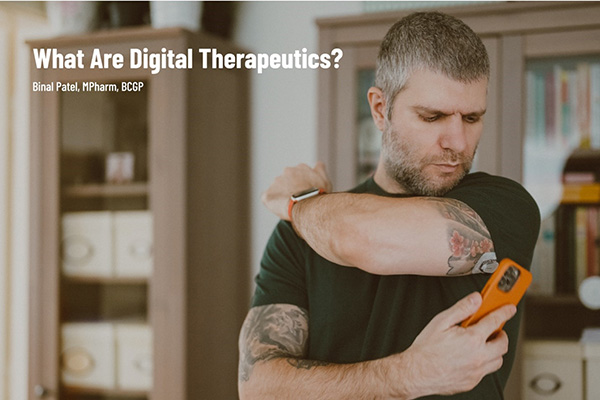What are Digital Therapeutics?
April 9, 2025

Imagine a world where your patients can access personalized, evidence-based care from the comfort of their homes where there’s no waiting rooms, no travel time, just immediate, data-driven support. For pharmacists and managed care professionals, this is not a distant dream but a rapidly evolving reality. The rise of digital health is rewriting the rules of patient care, and at its forefront are Digital Therapeutics and Telehealth, two trending forces poised to transform healthcare delivery as we know it.
The Digital Health Revolution
Digital health is an all-encompassing term that covers everything from mobile health, health information technology, wearable devices, telehealth, telemedicine, and personalized medicine.1 According to the World Health Organization, digital health solutions are integral to our daily lives, playing a critical role in achieving global health and well-being.2 What once seemed like futuristic technology is now becoming a standard component of patient care, especially in an era marked by the COVID-19 pandemic, where in-person visits became limited and virtual care rapidly gained momentum.
Today, patients are not only becoming more comfortable with digital interactions but are also increasingly taking charge of their own health. This empowerment is partly driven by the convenience and personalization digital health offers. For pharmacists and managed care professionals, these technologies represent an opportunity to enhance patient outcomes, optimize care coordination, and streamline workflows—all while addressing a growing demand for accessible health care services.
What are Digital Therapeutics?
Digital Therapeutics (DTx) represent a groundbreaking category within digital health solutions. Unlike traditional medications, DTx deliver evidence-based therapeutic interventions via high-quality software programs. These interventions are designed to treat, manage, or even prevent various diseases and disorders. They can be used as stand-alone treatments or in conjunction with traditional therapies to enhance patient care.3
For instance, many DTx products leverage cognitive behavioral therapy (CBT) delivered through smartphone apps or tablets. This innovative approach has proven effective for chronic conditions such as depression, anxiety, insomnia, and even substance use disorders. As of January 2023, there were five DTx products using CBT as the primary interventions that were FDA-authorized and required a prescription.4
Notably, the U.S. Food and Drug Administration (FDA) has already authorized several prescription digital therapeutics (PDTs), which require a prescription from a licensed health care practitioner. These FDA-authorized products have paved the way for broader acceptance and integration of DTx into mainstream care. The Digital Health Trends 2024 report by IQVIA reported that there were over 140 approved DTx products that have been granted market access through national regulatory and reimbursement pathway.5
DTx also harnesses the power of real-time data collection, enabling continuous monitoring and adjustments based on a patient’s progress. With personalized algorithms and machine learning, these tools offer tailored therapy that can adapt to individual needs, transforming the traditional “one-size-fits-all” model of health care.
Opportunities and Challenges in Digital Therapeutics
Expanding Access and Advancing Health Equity
One of the most compelling advantages of digital therapeutics is its potential to improve access to care, particularly in underserved and rural areas. A Pew Research study found that 80% of U.S. adults in rural areas own a smartphone.6 With DTx interventions delivered via mobile devices, patients in these communities can access high-quality care without the need for frequent in-person visits. This improved access not only reduces health disparities but also helps mitigate the impact of health care provider shortages.
Moreover, digital therapeutics can provide timely, personalized care when patients need it most, whether they’re managing chronic conditions or navigating a sudden health crisis. By complementing traditional care models, DTx helps bridge gaps in care delivery, paving the way for a more equitable and efficient health care system.
Navigating Regulatory and Reimbursement Hurdles
Despite its benefits, the path to widespread adoption of digital therapeutics is not without challenges. Unlike conventional medications, DTx products are reviewed under the FDA’s medical device pathways, such as premarket notification [510(k)] and De Novo classification requests.7 These pathways, while ensuring safety and efficacy, often require real-world evidence to bolster acceptance. Additionally, reimbursement for DTx remains a complex issue, as these products may fall under various benefits like pharmacy, medical, or behavioral health.
Recent legislative developments, such as the establishing new Healthcare Common Procedure Coding System (HCPCS) codes for FDA-authorized PDTs and the introduction of the bipartisan Access to Prescription Digital Therapeutics Act of 2023, signal a shift toward better integration of DTx into health care systems.8,9,10 However, for pharmacists and managed care professionals, understanding and adapting to these evolving regulations is crucial for the successful incorporation of digital therapeutics into patient care strategies.

Actionable Tips for Pharmacists and Managed Care Professionals
To harness the full potential of digital health innovations and digital therapeutics, consider these three actionable tips:
1. Stay informed on regulatory and reimbursement changes
The regulatory landscape for digital therapeutics is evolving at a rapid pace. As new HCPCS codes are established and legislative proposals move through Congress, it’s essential to keep abreast of these changes.
- Subscribe to industry newsletters and journals: Staying updated through reliable sources will help you anticipate shifts in policy and reimbursement structures.
- Participate in professional associations: Organizations like the Digital Therapeutics Alliance (DTA) and local pharmacy groups often provide valuable insights into regulatory developments.
- Engage in continuous education: Attend webinars, conferences, or workshops focused on digital health to ensure that your practice remains compliant and at the forefront of innovation.
2. Explore integrative approaches to patient care
Integrating digital therapeutics into your practice can enhance patient outcomes and streamline care coordination. Consider piloting programs that incorporate DTx alongside traditional therapies.
- Start with a small-scale pilot project: Choose a specific patient population or chronic condition to implement digital therapeutics and measure the outcomes to determine efficacy.
- Collaborate with tech providers: Partner with reputable digital health companies that offer FDA-authorized DTx solutions. This collaboration can provide valuable insights into how digital tools can complement your existing treatment protocols.
- Leverage data analytics: Use real-time data collected by DTx platforms to monitor patient progress and adjust treatment plans as necessary. This data-driven approach not only improves individual patient care but also contributes to broader population health management.
3. Enhance digital health literacy across your organization
For digital therapeutics to succeed, both health care providers and patients need a solid understanding of digital health tools. Enhancing digital health literacy is a critical step in driving adoption.
- Offer training sessions: Conduct regular training for your team to familiarize them with new digital tools and platforms. Focus on how these technologies can be integrated into patient care and the benefits they offer.
- Develop patient education materials: Create resources such as brochures, videos, or interactive guides to help patients navigate digital therapeutic solutions. Clear, accessible information can alleviate concerns and boost engagement.
- Foster a culture of innovation: Encourage your team to share experiences, insights, and success stories related to digital therapeutics. A collaborative environment can drive continuous improvement and enhance overall patient care.
The New Horizon: Digital Therapeutics as a Game-Changer
Digital therapeutics, powered by innovative technologies like telehealth, are paving the way for a new era in health care—one that combines digital innovation with evidence-based treatments to empower patients and optimize outcomes. As health care professionals, embracing these technologies means not only staying current with trends but also actively shaping the future of care.
By integrating digital therapeutics into your practice, you can improve patient engagement, reduce overall health care costs, and address longstanding issues of access and equity. While challenges remain, especially in the realms of regulation and reimbursement, the potential benefits far outweigh the obstacles.
The evolution of digital health is a collaborative journey. Pharmacists and managed care professionals play a pivotal role in this transformation by driving innovation, advocating for policy changes, and ensuring that patient care remains at the heart of every technological advancement.
Lead the Change with PerformRx
If you’re passionate about leveraging digital therapeutics and telehealth to enhance patient care, it’s time to explore the programs that can truly elevate your practice.
Contact us today at info@performrx.com to learn more about PerformRx’s innovative programs, you can navigate the complexities of regulatory changes, pilot new digital therapeutics projects, and enhance digital health literacy across your organization.
Sign up today to receive exclusive insights, actionable strategies, and updates on how PerformRx is driving the future of healthcare. Join a community of forward-thinking professionals dedicated to making a tangible impact on patient care.
References:
- “What is Digital Health”, U.S. FDA, https://www.fda.gov/medical-devices/digital-health-center-excellence/what-digital-health
- ‘Digital Health.” WHO, https://www.who.int/health-topics/digital-health#tab=tab_1
- “Understanding DTx,” Digital Therapeutics Alliance, https://dtxalliance.org/understanding-dtx/what-is-a-dtx/
- Digital Therapeutics Using Cognitive Behavioral Therapy” IPD Analytics, January 9, 2023, http://www.ipdanalytics.com.
- "Digital Health Trends 2024,” IQVIA, December 12, 2024,. https://www.iqvia.com/insights/the-iqvia-institute/reports-and-publications/reports/digital-health-trends-2024
- “Mobile Fact Sheet,” Pew Research Center, April 7, 2021, https://www.pewresearch.org/internet/fact-sheet/mobile/
- “The Current Landscape and Complexities of Digital Therapeutics” IPD Analytics, August 24, 2021, http://www.ipdanalytics.com.
- “Prescription Digital Therapeutics.” AMCP, March 9, 2023. https://www.amcp.org/policy-advocacy/legislative-regulatory-issues/prescription-digital-therapeutics

Sign Up for Updates
Receive updates from PerformRx about the latest blog posts, news announcements, upcoming conferences and more.
Sign up